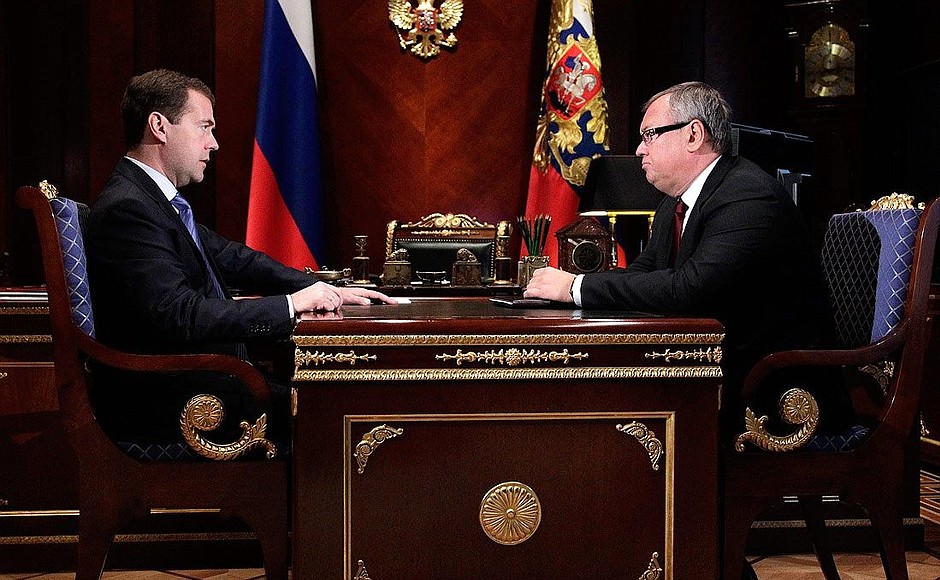
Granting banks broader powers to help prevent money-laundering activity was also discussed at the meeting. Mr Kostin briefed the President on VTB Bank’s proposals in this area.
* * *
President of Russia Dmitry Medvedev: The situation on the financial markets is complicated. We are to be very careful. But that is a topic for another special discussion. Perhaps we will meet with colleagues from the Cabinet and discuss it very soon, inviting the banking community to join us, because we should have a clear picture of what is going on, which are the objective and subjective factors, as well as the forecasts for Europe and the euro zone, and the situation with the US economy, including a whole set of complicated, controversial decisions that our American colleagues have taken. So in any case, this is a topic that can be analysed another day.
As for you and I, let’s focus on the work of VTB Bank and, first and foremost, your input into the creation of our financial centre, because whatever twists and turns or storms may occur within international financial markets, the goal to create a Russian financial centre remains unchanged. This is our strategic choice; it is important for Russia and it is important for our partners. So we are moving forward in this direction by making administrative decisions and designing the necessary regulatory framework, as well as through concrete instructions given to specific participants in this process.
An important component of this process is the fight against laundering unlawful income, as well as the overall transparency of the banking system. Right now, everyone is addressing this. Therefore, as a major bank, VTB Bank must also contribute.
Have you done anything in this area? Please tell me about it.
VTB Bank Chairman and CEO Andrei Kostin: Mr President, the fight against money laundering is an important component of the banking business overall. And I would like to stress two matters. First, naturally, the banks themselves are responsible for monitoring the transactions of their clients. The second is Russian legislation, its improvement, and law-enforcement practice. This is daily work. I can say that in the last year alone, the bank sent about 12 thousand notifications to the Federal Service for Fiscal Monitoring concerning suspicious transactions (although it’s true that this is a high figure, it’s nevertheless lower than one percent of all client transactions). We sent another 42 thousand notifications concerning standard transactions that must nevertheless be reported to the Federal Service for Fiscal Monitoring.
I must say that we have not recorded a single case where a transaction was linked to financing organisations or individuals connected with terrorist or extremist activities. In most cases, these are tax issues. These involve either avoiding taxation or reducing the tax base – those kinds of transactions, having to do with that domain.
But there is one problem that I would like to draw your attention to. We, the banking community, believe that today’s laws do not give us sufficient power to fight these negative instances more effectively. I am referring to the fact that currently, the only thing we can really do is inform the Federal Service for Fiscal Monitoring and the Central Bank about these transactions. According to the Civil Code and the legislation, we do not have the right to unilaterally breach contract with our clients: to close an account or not allow the transaction. I think it is imperative to make certain amendments, and in cases when banks have reasonable suspicions, to grant them the right to decide not to allow the transaction, or even close the account. In other words, we would like to act preventively. Instead of dealing with wrongdoers later, we will prevent their unlawful activities. Again, we do not currently have the tools to do this; we can only issue some administrative pressure. And we manage to do it – in the last year, we have closed the accounts of about one hundred citizens and one hundred companies, mainly through this kind of proactive pressure.
Dmitry Medvedev: You know, I have spent a great deal of time working with businesses and within businesses. A bank has a thousand opportunities not to execute a transaction. We know this very well. At the same time, I do not rule out the need to analyse the regulatory framework of European Union nations and other states with regard to unilateral refusal to carry out instructions given by a client, if these instructions elicit doubts with regard to current legislation, including legislation on white-washing income earned unlawfully.
But before we change the Civil Code or the legislation on banks and banking activities, we must study international practices and see how corresponding banks’ rights are formulated in those countries. I agree that this problem exists and needs to be resolved, to ensure that the tools available to you are not based solely on power, since frankly speaking, a bank always has more power than a client; it is the strongest party in a contract. Banks also need a legislative toolkit to resolve this issue.
Overall, this is a systemic problem. Everyone faces difficulties, as do many banks. Certainly, the supervising agencies are to ensure that all these issues do not swell and turn into major problems affecting the entire banking community, the entire system of banks in our nation. This is truly very important.
Andrei Kostin: Therefore, with your consent, I have already consulted with the Federal Service for Fiscal Monitoring, the government, the Central Bank, and the Finance Ministry, and we will address the issues you have defined, and if necessary, make joint suggestions accordingly.
Dmitry Medvedev: Very well. I will see, because in any case, we should move in the direction of civilised relations between banks and clients, between banks and companies or individuals. Overall, this is a strategic position connected to creating a financial centre in our country.
<…>